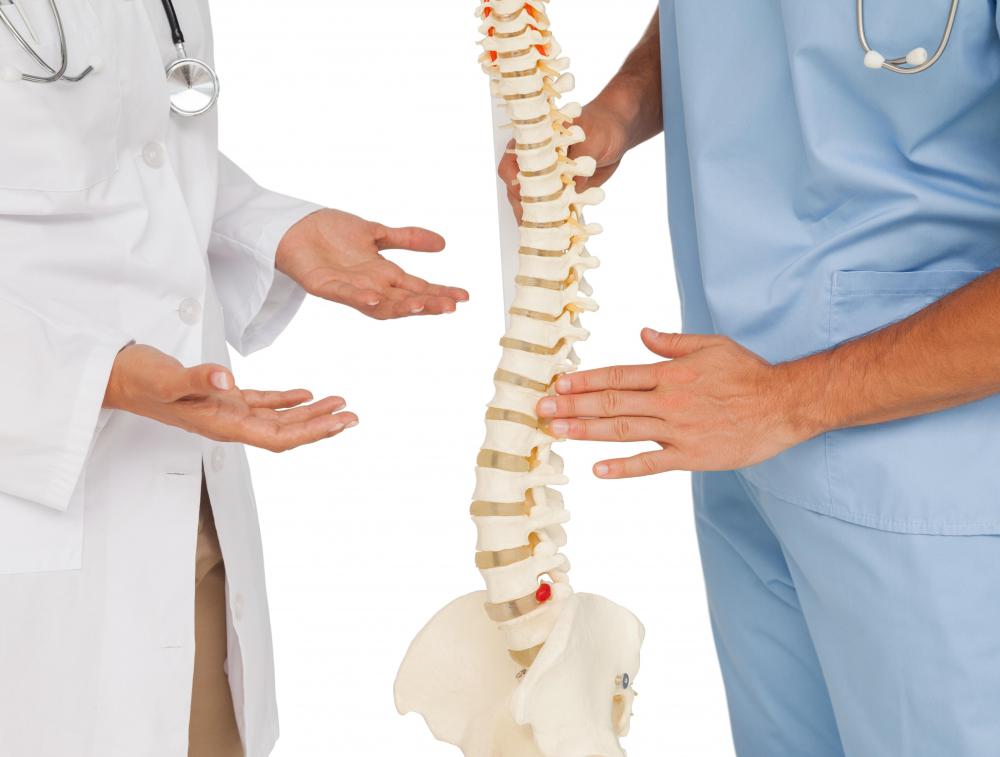At WiseGEEK, we're committed to delivering accurate, trustworthy information. Our expert-authored content is rigorously fact-checked and sourced from credible authorities. Discover how we uphold the highest standards in providing you with reliable knowledge.
How do I Recognize Neck Pain from a Pinched Nerve?
One way you might be able to recognize neck pain from a pinched nerve is if you have other underlying conditions. For instance, arthritis, which affects the neck and spine, may compress nerves of the neck, causing a pinched nerve. Another way to differentiate this type of pain is by how it feels. A pinched nerve may cause a stinging and prickly sensation or numbness, which often radiates to other areas of the body. Along with the pain, you may also get unusual headaches.
A pinched neck nerve can cause pain anywhere in the neck area. This may be accompanied by a loss of sensation or feeling of deadness, which may be localized to the neck itself or spread to the shoulders and arms. Loss of mobility is common with a pinched nerve. The patient may experience extreme discomfort or pain when moving the neck from side to side. Headaches at the base of the skull are also a frequent symptom.

When an individual is affected by arthritis of the back or neck, swelling may occur in those areas. When this happens, the compression of various nerves within the neck can also result. Therefore, patients with this type of arthritis can learn to recognize symptoms of neck pain from a pinched nerve simply by associating it with this form of arthritis.

Another condition that may create neck pain from a pinched nerve is a herniated disc. This is generally caused by pressure against the spine from a disc that is out of place, or slipped. If you have been previously diagnosed with a slipped disc, you may have neck pain caused by a pinched nerve. The best way to alleviate the pain and heal the pinched nerve is to reduce the pressure on the spine. This can be accomplished through the use of anti-inflammatory medication and by resting the affected area.

If you have acute or sudden neck pain, you should consider a pinched nerve as a possible cause. This is recognizable by a sudden pain or stiffness, easily provoked by an abrupt movement of the neck. If you have trouble falling asleep or finding a comfortable position to sleep in, your neck pain may also be a symptom of a pinched nerve.
Any type of neck pain that persists or is recurrent should not be ignored. You may not diagnosis it accurately yourself, and this could lead to a delay in proper diagnosis and treatment. A professional health care provider can determine if the neck pain is related to a pinched nerve and recommend the proper treatment for recovery.
AS FEATURED ON:
AS FEATURED ON:

















Discussion Comments
What I've noticed about pinched nerve pain is that the pain is constant. It does get worse when the neck is moved in a certain way, but there isn't really a time when there isn't discomfort or numbness or weakness. So I think that persistent pain that doesn't feel better at any time is a sign of a pinched nerve.
@fBoyle-- Although the causes differ, like arthritis, slipped disc or herniated disc, a pitched nerve is the same in each case. And each causes the same set of symptoms.
A pinch nerve is basically a nerve that is compressed. In the case of arthritis, inflammation (swelling) or abnormal bone growth can compress nerves. In a slipped disc, the disc can compress a nerve. In a herniated disc, the liquid from the disc or the inflammation it causes in that area can compress the nerve.
Whatever the cause, a pinched nerve will cause pain and change in sensations such as numbness, tingling or pins and needles. And these symptoms won't go away until that pressure on the nerve is released. Sometimes medications and physical therapy help but sometimes a small surgery may be needed.
Does the neck pain due to a pinched nerve vary depending on the underlying cause? So does neck pain from arthritis related pinched nerve differ from one caused by a herniated disc?
Post your comments